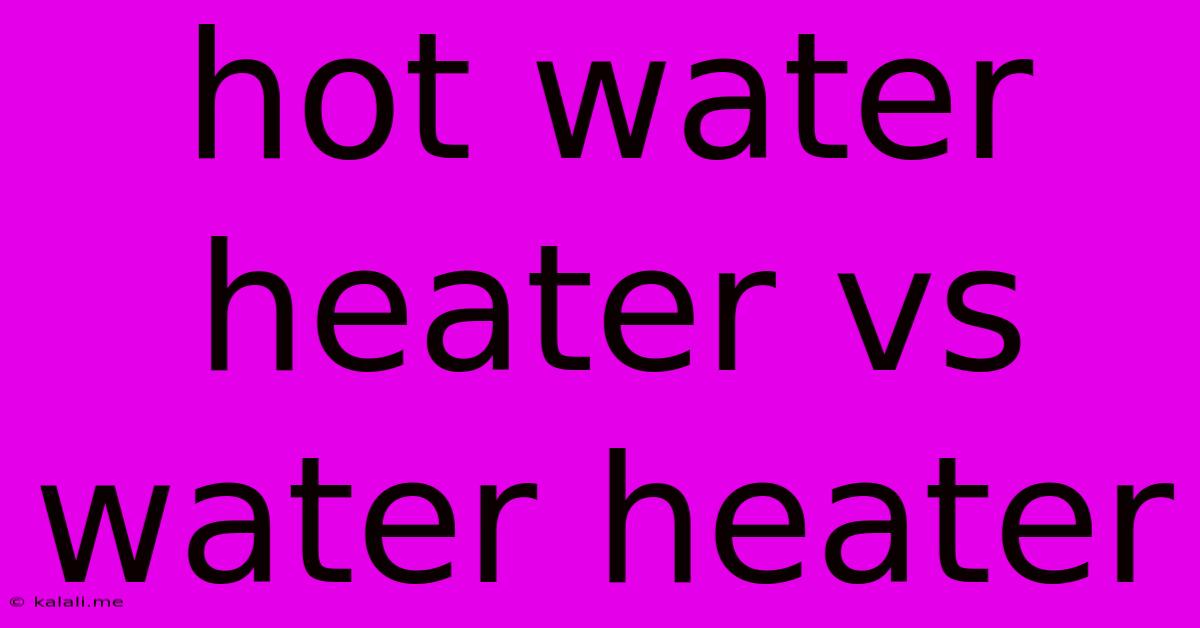Hot Water Heater Vs Water Heater
Kalali
May 23, 2025 · 3 min read

Table of Contents
Hot Water Heater vs. Water Heater: What's the Difference?
Choosing the right water heater can be a daunting task, especially with the seemingly endless options available. But before you dive into tankless vs. tank, electric vs. gas, you might be wondering about the seemingly subtle difference between a "hot water heater" and a "water heater." This article clarifies this common point of confusion and helps you understand the nuances of terminology. The short answer is: there's no real difference. Both terms refer to the same appliance.
The Terminology Tango: Why the Confusion?
The terms "hot water heater" and "water heater" are essentially interchangeable. Both describe an appliance designed to heat water for domestic use – showering, washing dishes, laundry, etc. The slight variation in phrasing simply reflects different conversational styles and regional preferences. Some people prefer the more descriptive "hot water heater," emphasizing the appliance's primary function: heating water to a usable temperature. Others opt for the simpler "water heater," focusing on the broader function of providing heated water.
Beyond the Names: Key Considerations for Choosing a Water Heater
While the names are largely interchangeable, the real decision lies in choosing the type of water heater that best suits your needs and budget. Here's a breakdown of the key factors:
1. Tank vs. Tankless:
-
Tank Water Heaters: These are the traditional, more common type. They store a set amount of hot water in a tank, constantly heating it to maintain a desired temperature. They are generally less expensive upfront but may have higher operating costs over time due to standby heat loss (energy used to keep the water hot).
-
Tankless Water Heaters (On-Demand Heaters): These heat water only when you need it, eliminating the need for a storage tank. This results in significant energy savings in the long run, especially in homes with low hot water usage. However, they typically have a higher initial cost and may require more powerful electrical or gas lines.
2. Fuel Source:
-
Electric: Electric water heaters are relatively inexpensive to install and maintain, and they're generally quieter than gas models. However, they can be more expensive to operate in areas with high electricity costs.
-
Gas: Gas water heaters are often more energy-efficient than electric models, especially in areas with low natural gas prices. They heat water faster but require venting and professional installation.
-
Solar: Solar water heaters utilize solar energy to heat water, offering significant long-term cost savings and environmental benefits. However, they often require supplemental heating systems for cloudy days and periods of low sunlight.
3. Size and Capacity:
The size and capacity of your water heater will depend on your household size and hot water consumption habits. Consider the number of people in your home, the frequency of showers and laundry, and other hot water demands when making your selection.
In Conclusion:
Don't get bogged down in the semantics of "hot water heater" versus "water heater." Focus instead on the critical factors – tank vs. tankless, fuel source, and size – to choose the ideal model for your home. Thoroughly researching your options will ensure you make an informed decision that aligns with your budget, energy efficiency goals, and lifestyle needs.
Latest Posts
Latest Posts
-
In Order Of Oldest To Newest
May 24, 2025
-
You Catch More Bees With Honey Than Vinegar
May 24, 2025
-
How Long Does A Sister Joist Have To Be
May 24, 2025
-
How To Change Text Opacity In Google Slides
May 24, 2025
-
Pdb Bash Gives Gibberish In Terminal
May 24, 2025
Related Post
Thank you for visiting our website which covers about Hot Water Heater Vs Water Heater . We hope the information provided has been useful to you. Feel free to contact us if you have any questions or need further assistance. See you next time and don't miss to bookmark.